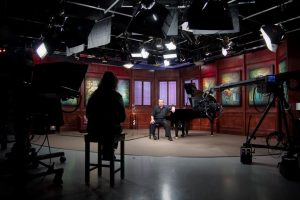 September is “Fine Arts Celebration” month for The Great Courses. To that end, I have been asked to write up a music curriculum that TGC can post on its social media channels. I preview it below:
September is “Fine Arts Celebration” month for The Great Courses. To that end, I have been asked to write up a music curriculum that TGC can post on its social media channels. I preview it below:
Among the questions I am most frequently asked (along with “what’s that aftershave you’re wearing?”) is a curricular one. That is, if my 27 in-print courses should constitute a curriculum, in what order should they be consumed?
An excellent question: in fact, I do not wear aftershave.
As for a curriculum, this is what I would recommend:
Category One: Pre-requisites
- “How to Listen to and Understand Great Music, third edition.” This remains The Great Courses’ “Music 101”, the entry-level pre-requisite for all my other courses. FYI: this course is an intensified version of the full-year music history sequence I used to teach at the San Francisco Conservatory.
- “How to Listen to and Understand Great Opera”. If “Great Music” (above) is Music 101, then this is Music 102: a broad survey of the single most important genre in Western music: opera.
- “The Fundamentals of Music”. This course expands on the vocabulary and listening skills first introduced in “Great Music” and “Great Opera.”
- From here on out my courses clump into four “elective” categories: composer biographies, opera courses, courses about general repertoire, and courses about specific repertoire by specific composers. Here are those “elective” categories, arrayed from the least technical to the more technical (be assured, though, that my more technical courses stay within the vocabulary introduced in “Great Music” and “Fundamentals”).
Category Two: Electives; biography
The category consists of my Great Masters series, which currently focuses on the lives of ten composers. (We desperately want to expand this series and will do so sooner or later!)
Category Three: Electives; opera courses
There are presently three courses in this category:
Category Four: Electives; courses about general repertoire
There are four courses in this category:
(FYI: we have a course entitled “The 23 Greatest String Quartets” in development that I will record in a couple of years.)
Category Five: Electives; courses about specific repertoire by specific composers
This category presently contains six courses:
- “Bach and the High Baroque”
- “Concert Masterworks”
- “The Symphonies of Beethoven”
- “The Chamber Music of Mozart”
- “The Piano Sonatas of Beethoven”
- “The String Quartets of Beethoven”.
And there you have it: 390 hours (16.25 days!) worth of me, babbling incessantly in the cause of wonderful music.

Electives? ELECTIVES? Every one of these lectures belongs solidly in the CORE curriculum, in my view.
Now, this may sound arrogant or deranged, but I’ve listened to ALL of these sensational lectures (quite a few twice), and not a single one could possibly be omitted from an interested listener’s curriculum. And, yes, the above order makes sense, although I suggest moving the series on Mozart’s Chamber Music a bit earlier on the list, since that set clarifies some important ideas and opens one’s ears in ways very helpful for appreciating later composers.
Professor, thank you for this marvelous body of educational masterworks.
After attending a Messiah sing-along, I realized how much I’d love to have a course by you which analyzes the work: its place in history, the music, the use of Scripture, its place in modern culture, etc. I hope you and The Great Courses will consider it.